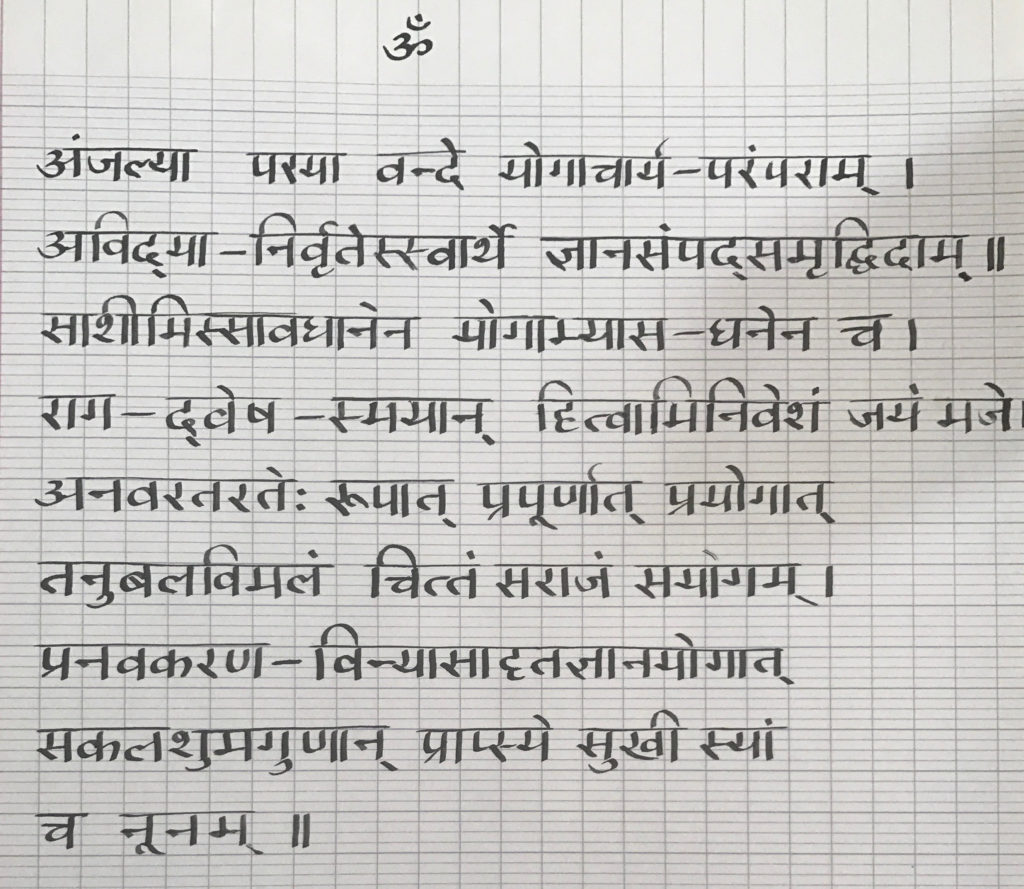|| नवकरण विन्यास प्रार्थना ||Navakaraṇa Vinyāsa Prārthanā – Opening Prayer
Prārthanā is a prayer as forming part of the worship of teachers and the Ultimate Being.This verse is a metre called Mālinī (मालिनी) with 15 syllables in each quarter and with a definite pattern of gaṇas (groups) of syllables named “na na am ya ya ( न न म य य )”; each gaṇa consisting of three syllables. This belongs to a category of chandas by name atiśakvarī chandas (अतिशक्वरी छन्दस्). The verse is closed (by the last word “nūnam” नूनम्) – a poetical “fancy figure of speech” or embellishment called utprekśā (उत्प्रेक्षा).
AUDIO FOR PRACTICE (15 minutes loop)
15 minutes MP4 Prārthanā (Prayer) + Svara (musical background)
Navakaraṇa Vinyāsa Prārthanā
Prārthanā is the innovation chanted at the beginning of Navakaraṇa Vinyāsa practice.
Original Sanskrit verse, editing (devenāgarī + romanic transliteration) english transition and chanting by Dario Calvaruso. Video taken at PURE Tower – Taipei on 27th June 2015.
The three verses refers to the three pillars of practice: gratitude towards the teachers, setting the objectives and total commitment. The invocation should be chanted only by those who are seriously committed in the practice of Navakaraṇa Vinyāsa.
अंजल्या परया वन्दे योगाचार्य-परंपराम् ।
अविद्या-निर्वृतेस्स्वार्थे ज्ञानसंपद्समृद्धिदाम् ।।
añjalyā parayā vande yogācārya-paraṃparām |
avidyā-nirvṛtessvārthe jnāna-saṃpad-samṛddhi-dām ||
With folded palms, with the maximum devotion, I bow to the entire lineage of the preceptors of yoga who bestow the richness of wisdom in full for the removal of primordial ignorance (i.e. the self’s final goal).
साशीभिस्सावधानेन योगाभ्यास-धनेन च ।
राग-द्वेष- स्मयान् हित्वाभिनिवेशं जयं भजे ।।
sāśīrbhis- sāvadhānena yogābhyāsa-dhanena ca ।
rāga-dveṣa-smayān hitvā-abhiniveśaṃ jayaṃ bhaje ||
I seek victory with constant and conscientious effort and complete dedication, giving up (destroying) the attachment, the aversion (enmity / hatred ) and the ego; with the(ir) blessings, diligent study
and with the wealth of yoga practice.
अनवरतरते: रूपात् प्रपूर्णात् प्रयोगात् तनुबलविमलं चित्तं सराजं सयोगम् ।
प्रनवकरण-विन्यासादृतज्ञानयोगात् सकलशुभगुणान् प्राप्स्ये सुखी स्यां च नूनम् ।।
anavaratarateḥ rūpāt prapūrṇāt prayogāt
tanubalavimalaṃ cittaṃ sarājaṃ sayogam |
pranavakaraṇa-vinyāsādṛtajñānayogāt sakalaśubhaguṇān
prāpsye sukhī syāṃ ca nūnam ||
I shall be committed to the practice of Navakarana Vinyasa with complete dedication, constancy and determination; I shall attain strength of body, purity of mind and practice the Rāja Yoga to conquest true knowledge of the Self, the bestower of Yoga, the destroyer of all afflictions.
Navakaraṇa Vinyāsa ™©
https://www.facebook.com/navakaranavinyasa
Navakarṇa Vinyāsa 6:45 am PURE YOGA AST – Yoga Sūtra updates
I am very happy for the fast learning of those who are attending regularly the 6:45 am Navakaraṇa Vinyāsa at PURE YOGA AST. I am prepping the new audio lessons; in the meanwhile I will keep this post always updated with the sūtras we are learning in class.Please refer always to this post for the updates.
To read the sūtras in devanāgarī, with romanic transliteration and english translation up to date and leave a comment click here.
Play the audio [I.1 to I.40]:
Learn Yoga Sūtra I:33
maitrī-karuṇā-mudito-pekṣāṇāṁ sukha-duḥkha-puṇya-apuṇya-viṣayāṇāṁ bhāvanātaḥ citta-prasādanam .
The practice of psychological measures
maitrī-karuṇā-mudito-pekṣāṇāṁ sukha-duḥkha-puṇya-apuṇya-viṣayāṇāṁ bhāvanātaḥ citta-prasādanam .
maitrī = friendliness
karuṇā = compassion; empathy;
mudita = content;
upekṣa = equanimity
sukha = happiness; joy
duḥkha = pain; suffering
puṇya = virtuous, good, pure
apuṇya = impure , wicked
viṣayānam = regarding those
bhāvanātaḥ = cultivation; nurturing;
citta = mind (mind-complex)
prasādanam =bringing to purity, brightness
Purity of mind is attained with cultivation of friendliness, compassion, content and equanimity in from joy and suffering – the virtuous and the non-virtuous.
The practice of Friendship is sharing happiness with others, be happy of other people’s happiness, and seeing all creatures as intimate friends.
The practice of Compassion consists in being aware of other creatures’ sufferance and helping them in overcoming pain and difficulties. Compassion is expanding our love beyond our family and restricted cycles of friends; It is true love towards all the creatures.
The practice of Content comes from appreciation of the present moment. It is appreciation of what we have and what we are – focusing on the goodness that we can see in other, in ourself and in the life itself.
The practice of Equanimity consists in controlling the mind when focuses on the virtues and vices of others . Once the mind is controlled a yogi can maintain calmness and composure even in difficult situation.
These psychological and ethical measures together with yama (ref. v.11) and niyama (ref. v.12), Pratipakṣa-bhavana (ref. v.13) and prāṇāyāma (breath control, ref. v.16 – [I.34]) are the the Yoga purificatory practices (Parikarma).
Anyaway only those who have really eradicate the primordial ignorance (avidyā) will be able to archived success in the practice of this psychological measures and in yoga itself as all karma-s proceed from the five-fold afflictions:
avidyāsmitārāgadveṣābhiniveśāḥ kleśāḥ.
(avidyā-asmitā-rāga-dveṣa-abhiniveśaḥ kleśāḥ)
avidyā = ignorance; nescience;
asmitā = ego; identification with the psychophysical body;
rāga = desire; attraction;
dveṣa = revulsion; aversion;
abhiniveśaḥ = clinging to life; fear of death; will to live;
kleśaḥ = afflictions.
Ignorance (avidyā), ego-ness (asmitā), attachment (rāga), aversion (dvesạ ) and clinging to life (abhiniveśa) are the afflictions (kleśa-s – causes of illusions, delusions, sorrows and pains). Ignorance is nothing but recognising oneself with body and mind (i.e. the non-self) [II.5]. From ignorance arises “ego-ness”, “I” and “mine” is produced by failing in distinguishing between the real Self (puruṣa) and intellect (buddhi – the reflection of consciousness into sattva) [II.6]. From ego (asmitā) raises attachment (rāga) as byproduct of pleasure [II.7]. Sufferings and sorrows arise from attachment. According to Patan̄jali, sorrow is intrinsic in both attachment and pelasure all kind of enjoyments are only temporary. From sorrow arises aversion (dvesạ) as consequence of suffering [II.8]. From aversion arises clinging to life and fear of death. Actions proceed in order to preserve and protect ourself from whatever threaten our belongings, possessions or life [II.9]. All these afflictions generate sorrow.
info@navakaranavinyasa.com
www.navakaranavinyasa.com
yoga sūtra – Lesson 2.1 – samādhi pāda – verse 12th to 22nd
Learn the Yoga Sutra of Patanjali with Dario Calvaruso
Lesson 2.1; chapter I verses 12 to 22
Dear Student,
I spent my entire CNY holidays to prepare the second class video / audio format. Feel free to share it and leave a comments if you have any question. I’ll post soon the lessons 2.2 and 2.3. Keep learning ! 😉
yoga sūtra - samādhi pāda - verse: 12th - 22nd
अभ्यासवैराग्याभ्यां तन्निरोधः ॥१२॥
abhyāsa-vairāgya-ābhyāṁ tan-nirodhaḥ ||12||
The total control (of mental the operations) is achieved through practice (discipline) and non-attachment.
तत्र स्थितौ यत्नोऽभ्यासः ॥१३॥
tatra sthitau yatno-‘bhyāsaḥ ||13||
Practice is endeavour in virtuous conduct.
स तु दीर्घकाल नैरन्तर्य सत्कारासेवितो दृढभूमिः ॥१४॥
sa tu dīrgha-kāla nairantarya satkārāsevito dṛḍha-bhūmiḥ ||14||
That (practice should be) performed for a long time, uninterruptedly and with total dedication (till) is firmly established.
दृष्टानुश्रविकविषयवितृष्णस्य वशीकारसंज्णा वैराग्यम् ॥१५॥
Dṛṣṭa-anuśravika-viṣaya-vitṛṣṇasya vaśīkāra-saṁjṇā vairāgyam ||15||
Non-attachment is consciousness subjugation (self-mastery) and freedom from desire for sense objects seen or heard.
तत्परं पुरुषख्यातेः गुणवैतृष्ण्यम् ॥१६॥
tat-paraṁ puruṣa-khyāteḥ guṇa-vaitṛṣṇyam ||16||
The highest (non-attachment) which comes from
knowledge of the Self is freedom from desire of all natural manifestations.
वितर्कविचारानन्दास्मितारुपानुगमात्संप्रज्ञातः ॥१७॥
vitarka – vicāra – ānanda – asmitā-rupa – anugamāt – saṁprajñātaḥ ||17||
Saṁprajñāta (saṁprajñāta samādhi or spiritual absorption where consciousness contains objects) is of four types (in order of progress): gross, subtle, bliss, and “I-ness”.
विरामप्रत्ययाभ्यासपूर्वः संस्कारशेषोऽन्यः ॥१८॥
virāma – pratyaya – abhyāsa – pūrvaḥ saṁskāra – śeṣo-‘nyaḥ ||18||
By total control of the mind achieved through discipline the other (Asaṁprajñāta samādhi – where consciousness contains no object) it is attained (and) only subconscious impressions remains.
भवप्रत्ययो विदेहप्रकृतिलयानम् ॥१९॥
bhava – pratyayo videha – prakṛti – layānam ||19||
(If discipline is not combined with total non-attachment the aspirant) will reach a state of disincarnate being or merges with the forces of Nature.
श्रद्धावीर्यस्मृति समाधिप्रज्ञापूर्वक इतरेषाम् ॥२०॥
śraddhā – vīrya – smṛti samādhi – prajñā – pūrvaka itareṣām ||20||
It (Asaṁprajñāta samādhi) is very near for those having faith, vigour, memory and (have attained) spiritual absorption (saṁprajñāta samādhi).
तीव्रसंवेगानामासन्नः ॥२१॥
tīvra – saṁvegānām – āsannaḥ ||21||
It (Asaṁprajñāta samādhi) is (also) near for those who practice intensively.
मृदुमध्याधिमात्रत्वात्ततोऽपि विशेषः ॥२२॥
mṛdu-madhya-adhimātratvāt-tato’pi viśeṣaḥ ||22||
(Practice) varies according to the level (of commitment): mild, medium and intense.
quot. from Navakaraṇa Vinyāsa ™ – transliteration and translation by Dario Calvaruso © .
Learn the Yoga Sutra of Patanjali with Dario Calvaruso (Lesson 1.3 – chapter I, verses 1 to 11)
Lesson 1.3 – chapter I, verses 1 to 11
Chant over it! 🙂
Learn the Yoga Sutra of Patanjali with Dario Calvaruso (Lesson 1.2; chapter I, verses 1 to 11)
Lesson 1.2 – chapter I, verses 1 to 11 – Repeat the whole verse three times.
Learn the Yoga Sutra of Patanjali with Dario Calvaruso (Lesson 1.1; chapter I verses 1 to 11)
Lesson 1.1 – chapter I verses 1 to 11 – Word by word!
Learn the Yoga Sutra of Patanjali with the traditional method of “paṭha-paṭha” (recitation of the verse by the teacher followed by the recitation of the verse by student). First memorise by heart than gradually you we’ll a insight and understanding the meaning of the verses.
I aim to bring my students to learn the whole first chapter of the Yoga Sūtra within the 2015. Text is given in devanāgarī and IAST with english translation.
अथ योगानुशासनम् ॥१॥
atha yoga-anuśāsanam ||1||
Now the final teaching of yoga ||1|
योगश्चित्तवृत्तिनिरोधः ॥२॥
yogaś-citta-vṛtti-nirodhaḥ ||2||
Yoga is the retention of mind’s operations. 2
तदा द्रष्टुः स्वरूपेऽवस्थानम् ॥३॥
tadā draṣṭuḥ svarūpe-‘vasthānam ||3||
Then, there is the remaining of the Self alone in his true form. 3
वृत्ति सारूप्यमितरत्र ॥४॥
vṛtti sārūpyam-itaratra ||4||
Otherwise, (the Self has) the same form as the operations (of the mind). 4
वृत्तयः पञ्चतय्यः क्लिष्टाक्लिष्टाः ॥५॥
vṛttayaḥ pañcatayyaḥ kliṣṭākliṣṭāḥ ||5||
The fivefold operations (of mind) are afflicted (connected with pain or suffering) or non-afflicted (undisturbed). 5
प्रमाण विपर्यय विकल्प निद्रा स्मृतयः ॥६॥
pramāṇa viparyaya vikalpa nidrā smṛtayaḥ ||6||
(The operations of mind are) knowledge (comprehension), misapprehension, mental notion (imagination), sleep and memory. 6
प्रत्यक्षानुमानागमाः प्रमाणानि ॥७॥
pratyakṣa-anumāna-āgamāḥ pramāṇāni ||7||
Direct perception, inference, and scriptural testimony are the (three) kinds of (sources of true) knowledge. 7
विपर्ययो मिथ्याज्ञानमतद्रूप प्रतिष्ठम् ॥८॥
viparyayo mithyā-jñānam-atadrūpa pratiṣṭham ||8||
Misapprehension is false knowledge rooted upon an incorrect perception of an object. 8
शब्दज्ञानानुपाती वस्तुशून्यो विकल्पः ॥९॥
śabda-jñāna-anupātī vastu-śūnyo vikalpaḥ ||9||
Mental notion (imagination) is devoid of reality and follows from words. 9
अभावप्रत्ययालम्बना तमोवृत्तिर्निद्र ॥१०॥
abhāva-pratyaya-ālambanā vṛttir-nidra ||10||
Sleep is the operation (of mind) resting upon the experience of non-existence.10
अनुभूतविषयासंप्रमोषः स्मृतिः ॥११॥
anu-bhūta-viṣaya-asaṁpramoṣaḥ smṛtiḥ ||11||
Memory is the retention of sense objects that have been experienced.11
Navakaraṇa Vinyāsa ™ – transliteration and translation by Dario Calvaruso © .

